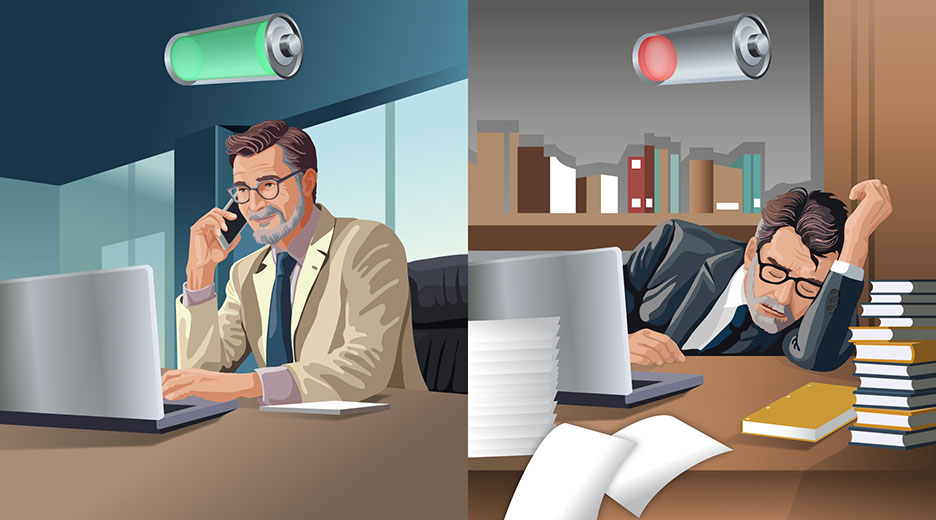Client Journey: Owner burnout – what to do when the ‘energy bank account’ is empty
Burnout — chronic physical and mental exhaustion — is a major problem for small business owners and the economy as a whole. Here we diagnose the key contributors to burnout in Australia and offer some tips for business owners to avoid it.

In article:
What is burnout?
Burnout is a state of physical and mental exhaustion, caused by prolonged stress. It occurs not just in paid work, but in other aspects of our life, such as parenting or caregiving. It can have physical symptoms, such as chronic fatigue, illness and headaches. It also has behavioural symptoms, such as shirking responsibilities, procrastination and alcohol or drug addiction. Often the burnt-out individual becomes cynical and experience ‘depersonalisation’.
Burnout is a special problem for small business owners and entrepreneurs. In a 2018 study of small business owners, the majority of participants claimed to be experiencing some degree of burnout, with 25% feeling moderately burned out, and 3% feeling strongly burned out. Post-covid, burnout in small business has only increased, with one 2022 study reporting burnout being at a rate of 42 percent.
Burnout even has official recognition with the World Health Organization (WHO) classifying burnout is an “occupational phenomenon” in its International Classification of Diseases (ICD-11) in 2019.
Burnout has significant consequences, including:
- Poor health outcomes for the business owners themselves, if burnout is not brought under control.
- Potential business failure — in our experience, the industries with the most incidences of insolvency in Australia (such as construction and transport) have high rates of burnout, with the business owners usually being middle-aged males (read more in When is a construction company insolvent?).
- Costs to the broader health system and economy — burnout is a major threat to the productivity of the economy and puts strain on an already stressed health system.
What causes entrepreneur burnout?
There is no one single cause of burnout, but some of the factors commonly seen in businesses where burnout occurs include:
- Over-work/lack of delegation — owners can only do so much, and placing all the responsibility on one or two individuals can have serious consequences. Furthermore, with a tight employment market for skilled staff, it is now harder than ever to get reliable staff to delegate to.
- Financial pressure. Where owners are feeling oncoming burnout they are often in industries with tight margins and considerable financial stress. Furthermore, those owners often have personal assets on the line through director personal guarantees.
- Loneliness. When you are the sole business owner, there is no one else to lighten the load: A problem that can’t be shared is a problem that can’t be halved.
- Health and wellness neglect. The long hours that often go with running a small business can mean insufficient sleep and exercise, as well as a poor diet. This can lead to a vicious cycle and increase the risk of total burnout.
- Skill deficits. Sometimes intense stress results from business owners being forced into roles that are beyond their capabilities. Not everyone is good at managing staff or finances.
- The business may be fundamentally unviable business. Where a business is unviable the risk of insolvency is real and it may be next-to-impossible to relieve that source of stress (read more about the indicators of business viability here).
There are various psychological theories that have been developed to explain burnout, all of which can make sense of these causes.
- Organizational Theory posits that burnout is a coping strategy — de-personalisation and disconnection from work is a way the body attempts to alleviate the unreasonable pressures it is under. A related formulation known as Demands–Resources Theory, holds that a state of a state of physical and mental exhaustion is simply the inevitable result of demands on the business owner exceeding the resources that they have to deal with those demands.
- Structural Theory holds that burnout is not a coping strategy, but a personal response to the failure of coping strategies. Not being able to deal with the stressors that they face results in a sense of professional failure and the negative emotions characterised as burnout
- Emotional Contagion Theory holds that burnout results from picking up the negative emotions of those who you are surrounded by. In other words, it may not be anything specific that an individual is facing that causes burnout, but the ‘bad vibes’ of their toxic work environment.
The differences between these theories are fairly academic: They key point is that burnout is a natural physical response to a negative work environment. The only way to effectively deal with it is to improve that work environment.
How should businesses and business owners avoid or deal with burnout?
First of all, any business owner experiencing burnout symptoms needs to prioritise their own health:
- Alcohol and drugs are to be avoided — it tends towards a vicious cycle which makes the burnout worse. Instead, the focus needs to be on healthier relaxation alternatives, such as meditation and exercise.
- If possible, take a holiday to ‘reset’. You may be surprised how quickly you can resolve thorny business issues after you have taken the time to completely disconnect.
- Don’t be afraid to ask for professional mental health support.
To avoid burnout, you need to think about steps you can take in your business:
- Get strategic advice on the business, and whether you can make your business model more efficient and how those workplace stressors can be alleviated or eliminated.
- Delegate where possible and create an effective team to take on more of the load.
- Schedule proper time off and holidays, and stick to it.